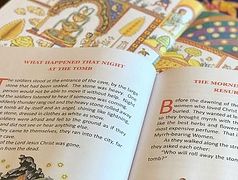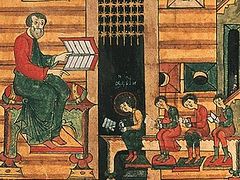The following is an informational interview on the new book, The Good Samaritan: A Children’s Catechism, with its author, V. Rev. Michael Shanbour.
 Photo: wenorthodox.com —What exactly is this new catechism and is it available to others? Can you provide a bit of a description of this work?
Photo: wenorthodox.com —What exactly is this new catechism and is it available to others? Can you provide a bit of a description of this work?
—The Good Samaritan: A Children’s Catechism is a unique, first-of-its-kind, comprehensive catechism for children approximately ages six to twelve. It is written in an engaging and understandable way, sometimes using analogy and metaphor to help young readers comprehend the primary aspects of the economy of salvation and the Orthodox Christian faith. Yet it maintains a fully biblical and patristic approach in content and ethos.
The catechism is beautifully illustrated, but it is not a picture book with a couple of sentences here and there! There are thirteen lessons and 118 pages bound in an attractive 8.5” x 11” hardcover format.
The catechism takes the reader from life in Paradise, through the Fall of Adam and the reality of Sin and corruption, and into life of Redemption through Jesus Christ. In the Church we then encounter Holy Tradition, the dynamic “river” that runs through the midst of the Church and provides the “living water” for our thirsty souls. The treasure of Holy Tradition then presents to us the Holy Mysteries of the Priesthood, the Eucharist, and Baptism, along with Repentance or Holy Confession, all of which are essential for the health and salvation of our souls. Finally, Prayer, Fasting, and Almsgiving are shown to be the indispensable means of union with God and as lifegiving manifestations of faith, hope, and love. After the introductory chapter, each new lesson begins with a brief summary of the previous chapter.
The whole catechism is held together through the overarching theme of the parable of the Good Samaritan (Lesson One), as interpreted by St. John Chrysostom and other Fathers, which views the whole economy of God as the healing of man through Christ in His “spiritual hospital,” the Church.
—How did the idea for a children’s catechism come about? What led you to write this book?
I have worked with both teens and pre-teen children much of my life of ministry, as a camp counselor, youth director and priest now for almost 19 years. My favorite work was with pre-teens, doing Bible study in a fast-paced and creative way. Each year, during the summer, I hold a weekly teaching for our young people at Three Hierarchs in Wenatchee, Washington. Instead of Bible study, one year I decided to do a catechism. This required that I plan each lesson in an organized fashion. By the end, I had a full catechism! Of course, it has been refined numerous times since. I’ve used this catechism for my parish kids several times.
—How do you envision that the catechism will be used?
In a variety of ways! Priests can use The Good Samaritan to catechize young people coming into the Church with their parents, but who are often left out of the catechetical process. The adult catechism is typically just too difficult and time-consuming for them. I’ve personally seen the detrimental effects when children are not instructed in the Faith from the outset. Without being grounded, they often end up leaving the Church in their teen or college years.
Parents can use the catechism at the dinner table or for nightly reading before bedtime. They can read one lesson (or part of a lesson) at each setting, using it to open various topics of interest and to facilitate further discussion. Homeschooling parents can incorporate the catechism into their curricula.
The catechism may also be an excellent Sunday/Church school text for our parish teachers and a tool for youth leaders.
I should note that several adults have already read the catechism and have commented how much they have learned. This will be true for adults who have never had a formal or extensive catechism, e.g. many Orthodox Christians who were baptized in infancy. This was the case recently with my father who is 87 years old and grew up when there was no Orthodox Church nearby.
I do believe teenagers will get a lot out of the catechism too.
—What do you consider some of the more uniquely presented teachings?
—First, I would point to the teachings in Lesson One on life in paradise. Not that these teachings are unique, but many Orthodox Christians are simply not aware of the Church Fathers’ teachings regarding life before sin. Yet it is vital to our understanding since what existed in paradise is “normal,” and often the way we live in this world is not necessarily optimal according to our true nature. In addition, if salvation in Christ is akin to a return to paradise as some Fathers explicitly teach (see St. Gregory of Nyssa), we need to know what that is.
The catechism follows the Fathers in describing sin as a sickness in need of healing, rather than a crime in need of punishment. Jesus Christ is presented as the “Medicine” and the Church as the place where one can get this medicine through the sacraments and ascetical life.
In the lesson on sin, the passions are described as magnets in our heart that are attracted to and “stick to” things outside of us that are not natural and healthy for us.
Holy Tradition is presented as the great “River of Grace” that runs through the Church, into which we must dive and swim if we are going to be continually refreshed and washed.
There are many more, but I will mention only one: The Priesthood. It is so important that we understand the dynamic and dignified nature of the Priesthood and the priest’s role in our salvation.
—Have you received any endorsements?
—Yes. Endorsements from Fredericia Mathewes-Green and Fr. Noah Bushelli appear on the back cover. Bishop Basil Essey of Wichita and Mid-America (Antiochian Archdiocese) says the following:
“What a wonderful gift you have given to the Church in The Good Samaritan: A Children’s Catechism! Not only is it doctrinally sound, but it is written and illustrated to fully engage its intended audience in learning of the great love of our Triune God for His people. May it me mightily blessed for the edification of the little lambs of Christ’s flock and for the upbuilding of His Body, the Holy Orthodox Church.”
—There may be more to come.
—Is the book available to order? Where and how?
—The Good Samaritan can be ordered online at www.wenorthodox.com/store. There is an entire lesson available for view on this site. Bookstores can receive a wholesale discount of 40% by emailing wenorthodoxy@gmail.com. The catechism will be shipping after the middle of December but pre-orders are being taken at the above website.



